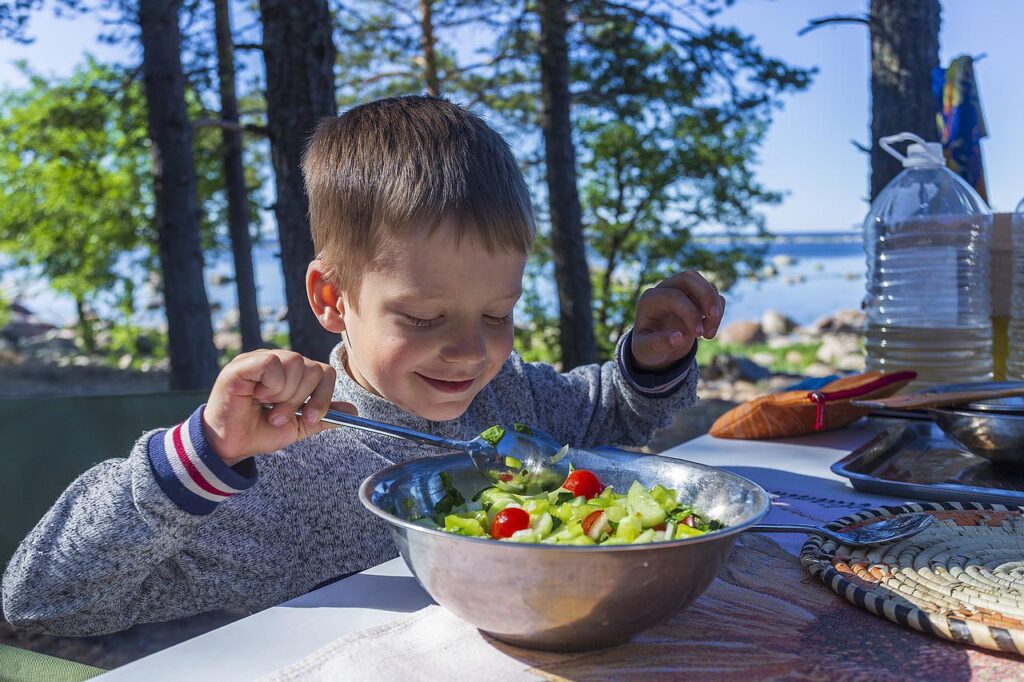Healthy Eating Tips for Young Toddlers
We all know the importance of eating healthy food for a baby in their growth and development process. We always try our best to feed our toddler but are they following us? Are you successful in feeding them as per their growth need? Does you kid enjoy every meal presented by you at the table? Are they stubborn about food? Do you have to negotiate with food every day?
As a parent, we all face difficulties in feeding a toddler. Sometimes, it even turns out to be a burnout moment that we do not want to face such situations again and end up in giving junk and processed foods instead of building healthy food habits in children. Eating habits during childhood will have a lifelong impact on the child’s health, so act accordingly.

Before we move further into toddler’s eating habit, we as a parent have to understand that feeding a toddler is a real challenge because we are teaching the little one to nurture themselves with food. And the amazing part of it is that they are too innocent to understand all this process. We can overcome this challenge gradually with constant effort and patience towards our kids.
Now, let’s dive into the tips which will encourage the toddlers to adapt good eating habits and also parents to understand the eating habits of their child…
1. Every Child is Different
No two children can have same liking and preferences. Never compare your child growth and development with other, even if they are siblings.
Always take suggestion from other parent but do not force it on your child.
Few children takes time to attain healthy eating habits while some learns it fast. Always be gentle and show love while teaching them. If you will be furious they will be more and it is not good for both of you.
2. Appetite Varies
No two days will be same, one day your child eats properly and the other they through tantrums while eating. Toddlers appetite varies according to their activities and likings towards food habits.
Always prefer to give smaller quantities of several times a day. Small amount of meals in the plate will also encourage them to eat because they will not be under pressure of parents to finish it.
Do not expect from your child to finish ever meal. If your child is eating small amounts of main meals then add healthy snacks such as fruit and vegetable sticks.
Never force your kids to eat, otherwise eating will become an unhappy experience in long run.
3. Let Your Child Decide
Let your child decide how much they want to eat. Children can sense the amount of hunger naturally and they know when they are full more than us.
As a parent, our role is to decide what kinds of food we offer them and at what time.
Sometimes your child may behave cranky while looking at the food, take it away. They might have lost interest, or not doing well. If you push their boundaries and make them eat more. Then they might loose their ability to sense hunger and will end overeating even in future.
When you find your kids playing with foods instead of eating, then they are full.
4. Create Positive Environment
A happy and positive environment during meal times encourages child to eat properly. Eat together as a family, toddlers always copies and tries to learn the ways of adult. Your child will eat with you and enjoy the meal time.
Allow your child to explore the texture of food by touching, even if they make mess.
Toddlers tries to take ownership, let them eat by their own, help them when needed. Eating by own will create a lots of mess and that’s okay, this way your toddler is exploring the ways of eating and it will make them happy.
Your child is curious about the usages of spoons, fork, bowl, glass. They want to try it by themselves by looking how you are using it. Always encourage them, they will learn and control their movements while eating.
Talk pleasantly and do not ask or force them to eat fast. They will do in their own pace.
5. Introduce New Foods
When your baby start with solids, try to introduce a new food every 4-5 days. They will not eat everything you introduce to them at first time.
As a parent it is your duty to re-introduce the food after few days, they may not like it again but keep trying because only you know about the benefits of eating right and not them.
It takes around 10-12 tries for a child to accept few foods.
Variety in toddlers meal is too much important for their growth. Always try to stick to a balanced diet for them. Make sure they get fruits, vegetables, dairy product, cereals, milk(cow/formula/breastmilk) every day in one or different forms. Plan their meals accordingly.
Toddlers like finger foods, they like to eat while playing and running. You can keep handy fruits and vegetables sticks, cereal crackers whenever they need some energy. For a meal, give 3-4 different things to them in smaller portion. Looking at different textures on the plate they will be motivated to try all.
Your child is very busy exploring the surrounding, so their interest in sitting and eating reduces. They always try to learn and find new things. We need to make eating habit interesting to them.
When we already know what our child like to eat, at certain point to avoid tantrums and meltdown we keep serving it up. We must not do this, child development needs are more than just a single food. For better growth and nutrients intake, we should keep trying to feed them variety of foods.
6. Safety Directions
Always supervise your children while eating, until they are well trained. Older brothers and sisters should not supervise toddlers as they are not aware what food can cause the younger siblings to choke.
Do not provide to sticky food, it may stick to their tongue and makes it difficult to swallow leading to choking hazard for young children.
Food pieces should not be larger than half inches in any direction, if you are not confident then cut them smaller.
Avoid hard foods such as nuts, hard lollies, raw carrot until you have taught them to chew properly. Offer them steamed vegetables cut into small pieces. Stringy foods like string beans and celery is difficult to eat.
Do not rush your child to eat fast, they will end up with large amount of into their mouth that may lead to chocking.
How to know that your child might need help with food and eating?
Your child constantly refuses to eat.
Lots of stress and anxiety during mealtime.
When you are concerned about your child’s growth or overall nutrition.
When there is no improvement in eating wide ranges of food
As a parent you will constantly worry about there eating habits, and if it goes beyond something that you cannot understand or there is barely any improvement in your child’s eating habit, then contact your paediatrician for help.








